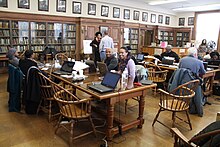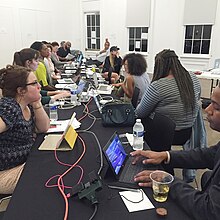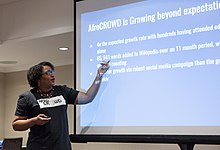| The examples and perspective in this article deal primarily with the United States and do not represent a worldwide view of the subject. You may improve this article, discuss the issue on the talk page, or create a new article, as appropriate. (May 2015) (Learn how and when to remove this message) |


The English Misplaced Pages has been criticized for having a systemic racial bias in its coverage. This bias partially stems from an under-representation of people of color within its volunteer editor base. In "Can History Be Open Source? Misplaced Pages and the Future of the Past," it is noted that article completeness and coverage is dependent on the interests of Wikipedians, not necessarily on the subject matter itself. The past president of Wikimedia D.C., James Hare, asserted that "a lot of is left out" of Misplaced Pages, due to articles predominately being written by white editors. Articles about African topics that do exist are, according to some, largely edited by editors from Europe and North America and thus, they only reflect their knowledge and their consumption of media, which "tend to perpetuate a negative image" of Africa. Maira Liriano of the Schomburg Center for Research in Black Culture has argued that the lack of information regarding Black history on Misplaced Pages "makes it seem like it's not important."
Different theories have been provided to explain these racial discrepancies. Jay Cassano, writing for Fast Company magazine, argued that Misplaced Pages's small proportion of Black editors is a result of the small Black presence within the technology sector, and a relative lack of reliable access to the internet. Katherine Maher, executive director of the Wikimedia Foundation, has argued that the specific focuses in Misplaced Pages's content are representative of those of society as a whole. She said that Misplaced Pages could only represent that which was referenced in secondary sources, which historically have been favorable towards and focused on white men. "Studies have shown that content on Misplaced Pages suffers from the bias of its editors – mainly technically inclined, English-speaking, white-collar men living in majority-Christian, developed countries in the Northern hemisphere."
In addition to the racial bias on Misplaced Pages, public encyclopedias are generally vulnerable to vandalism by hate groups, such as white supremacist groups.
Research findings and analysis
A challenge for editors who are trying to add Black history articles to Misplaced Pages is the requirement that potential article topics, such as historical individuals or events, meet Misplaced Pages's "notability" criteria. Sara Boboltz of HuffPost wrote that the Misplaced Pages notability criteria "is a troubling problem for those fighting for more content about women and minorities", because "there's simply less documentation on many accomplished women and minorities throughout history – they were often ignored, after all, or forced to make their contributions as someone else's assistant." Furthermore, the work of researching and including suppressed racialized voices is a labor that is mostly done by Misplaced Pages editors who are themselves oppressed, creating a further burden for them.
Maher stated that one issue is that "content on Misplaced Pages has to be backed up by secondary sources, sources that she says throughout history have contained a bias toward white men;" "people of color have not been represented in mainstream knowledge creation or inclusion in that knowledge," as "encyclopedias of old were mostly written by European men."
The racial bias on Misplaced Pages works towards a reinforcement of racist beliefs of the readers, but conversely, a reparation of that bias could develop more empathy in the readers for racialized folks. Efforts towards addressing bias have thus far created some space for white women, but not racialized or otherwise oppressed people.
According to Peter Reynosa, "there is an underrepresentation of Latinos who write for Misplaced Pages," and as a result "many topics may remain uncovered, or at the least these topics will not be given the attention they deserve."
In 2018, the Southern Poverty Law Center (SPLC) criticized Misplaced Pages for being "vulnerable to manipulation by neo-Nazis, white nationalists and racist academics seeking a wider audience for extreme views." According to the SPLC,
"Civil POV-pushers can disrupt the editing process by engaging other users in tedious and frustrating debates or tie up administrators in endless rounds of mediation. Users who fall into this category include racialist academics and members of the human biodiversity, or HBD, blogging community... In recent years, the proliferation of far-right online spaces, such as white nationalist forums, alt-right boards and HBD blogs, has created a readymade pool of users that can be recruited to edit on Misplaced Pages en masse... The presence of white nationalists and other far-right extremists on Misplaced Pages is an ongoing problem that is unlikely to go away in the near future given the rightward political shift in countries where the majority of the site’s users live."
The SPLC cited the article Race and intelligence as an example of the alt-right influence on Misplaced Pages, stating that at that time the article presented a "false balance" between fringe racialist views and the "mainstream perspective in psychology."
In June 2020, Misplaced Pages was described in Slate as a "Battleground for Racial Justice" in response to criticisms of neutrality, coverage of George Floyd and his murder, Black Lives Matter, and article deletion nominations for one of the founders of Black Birders Week.
According to Bjork-James, the racial bias of Misplaced Pages results not only in the underrepresentation of racialized people and knowledge, but also in the racist mischaracterization of historical and social phenomena which involve people other than whites. This means that the fixing of Misplaced Pages's racial bias cannot be achieved by the mere addition of more specialized content. Rather, it necessitates shifts in the presentation of many general-knowledge topics. Bjork-James writes that Misplaced Pages needs to broaden its use of reliable sources to include the large number of peer-reviewed academic publications in recent decades that endeavor to correct the Western orientation of most traditional sources.
Responses

Attempts have been made to rectify racial biases through edit-a-thons, organised events at which Misplaced Pages editors attempt to improve coverage of certain topics and train new editors. In February 2015, multiple edit-a-thons were organised to commemorate Black History Month in the United States. One such edit-a-thon was organized by the White House to create and improve articles on African Americans in science, technology, engineering and mathematics (STEM). The Schomburg Center, Howard University, and National Public Radio, also coordinated edit-a-thons to improve coverage of black history. "Misplaced Pages editors … have held 'edit-a-thons,'" to "encourage others to come learn how to ... contribute content on subjects that have been largely ignored." Liriano has endorsed Misplaced Pages edit-a-thons, stating that for Misplaced Pages's content to "be representative, everyone has to participate."
In 2015 and 2016, the Schomburg Center held a "Black Lives Matters" edit-a-thon to coincide with Black History Month. Volunteer editors added coverage about Black historical individuals and about key concepts in Black culture (e.g., about the Harlem Book Fair and about Black costume designer Judy Dearing). New articles about Black history and Black historical individuals were also created. The 2016 edit-a-thon was organized by AfroCROWD.
Misplaced Pages editors Michael Mandiberg and Dorothy Howard have organized diversity-themed edit-a-thons to "help raise awareness of some of the glaring holes on Misplaced Pages, and the need for people with diverse backgrounds and knowledge to fill them." Liriano stated "It's really important that people of color know that there's this gap" of coverage of Black history on Misplaced Pages "and they can correct it" by participating as editors. In the US, the National Science Foundation has provided $200,000 to fund research on the issue of bias in the coverage of topics in Misplaced Pages. The National Science Foundation has commissioned two studies of why there is bias in Misplaced Pages editing.
The Wikimedia Foundation is trying to deal with the issue of racial bias in Misplaced Pages. In 2015, it was reported that the Wikimedia Foundation made numerous grants "to organizations in the 'Global South'—including Africa, Latin America, Asia and the Middle East—with plans to improve Misplaced Pages." While Misplaced Pages supports these edit-a-thons, the organization has always stressed that adequate citations must always be present and neutrality must always be maintained. Misplaced Pages co-founder Jimmy Wales has stated that the Wikimedia Foundation has "completely failed" to meet its goals of resolving the lack of diversity amongst Misplaced Pages editors.
See also
- Criticism of Misplaced Pages
- Gender bias on Misplaced Pages
- Geographical bias on Misplaced Pages
- Systemic bias in Misplaced Pages
References
- Melamed, Samantha. "Edit-athon aims to put left-out black artists into Misplaced Pages". Philly.com. Archived from the original on 4 March 2016. Retrieved 13 April 2015.
- Rosenzweig, Roy (1 June 2006). "Can History Be Open Source? Misplaced Pages and the Future of the Past". Journal of American History. 93 (1): 117–146. doi:10.2307/4486062. ISSN 0021-8723. JSTOR 4486062.
- ^ Smith, Jada (20 February 2015). "Howard University Fills in Misplaced Pages's Gaps in Black History". The New York Times. Archived from the original on 23 February 2015. Retrieved 13 April 2015.
- Goko, Colleen. "Drive launched to 'Africanise' Misplaced Pages". BusinessDay. Archived from the original on 6 July 2015. Retrieved 13 April 2015.
- ^ Cassano, Jay (29 January 2015). "Black History Matters, So Why Is Misplaced Pages Missing So Much Of It?". Fast Company. Archived from the original on 10 May 2015. Retrieved 13 April 2015.
- ^ Lapowsky, Issie. "Meet the Editors Fighting Racism and Sexism on Misplaced Pages". Wired. Archived from the original on 14 November 2015. Retrieved 13 April 2015.
- ^ Boboltz, Sara (15 April 2015). "Editors Are Trying To Fix Misplaced Pages's Gender And Racial Bias Problem". Huffington Post. Archived from the original on 21 August 2017. Retrieved 20 August 2017.
- Klein, Adam (1 November 2012). "Slipping Racism into the Mainstream: A Theory of Information Laundering". Communication Theory. 22 (4): 427–448. doi:10.1111/j.1468-2885.2012.01415.x. ISSN 1050-3293.
- Lemieux, Mackenzie Emily; Zhang, Rebecca; Tripodi, Francesca (1 January 2023). ""Too Soon" to count? How gender and race cloud notability considerations on Misplaced Pages". Big Data & Society. 10 (1): 20539517231165490. doi:10.1177/20539517231165490. ISSN 2053-9517.
- Ezell, Jerel M. (15 June 2021). "Empathy plasticity: decolonizing and reorganizing Misplaced Pages and other online spaces to address racial equity". Ethnic & Racial Studies. 44 (8): 1324–1336. doi:10.1080/01419870.2020.1851383. ISSN 0141-9870.
- Adele Godoy Vrana; Sengupta, Anasuya; Bouterse, Siko (2020). "Toward a Misplaced Pages For and From Us All". In Joseph Reagle; Jackie Koerner (eds.). Misplaced Pages @ 20: Stories of an Incomplete Revolution. The MIT Press. hdl:20.500.12657/43467. Retrieved 5 December 2023.
- ^ Reynosa, Peter (3 December 2015). "Why Don't More Latinos Contribute To Misplaced Pages?". El Tecolote. Archived from the original on 8 December 2015. Retrieved 12 June 2020.
- ^ Ward, Justin (12 March 2018). "Misplaced Pages wars: inside the fight against far-right editors, vandals and sock puppets". The Southern Poverty Law Center. Retrieved 1 March 2020.
- Harrison, Stephen (9 June 2020). "How Misplaced Pages Became a Battleground for Racial Justice". Slate. Retrieved 1 July 2020.
- Bjork-James, Carwil (3 July 2021). "New maps for an inclusive Misplaced Pages: decolonial scholarship and strategies to counter systemic bias". New Review of Hypermedia and Multimedia. 27 (3): 207–228. Bibcode:2021NRvHM..27..207B. doi:10.1080/13614568.2020.1865463. ISSN 1361-4568. Retrieved 7 December 2023.
- Smith, Jada F. (20 February 2015). "Howard University Fills in Misplaced Pages's Gaps in Black History". The New York Times. Archived from the original on 21 August 2017. Retrieved 1 October 2018.
- Allum, Cynthia (29 February 2016). "Women leading movements to champion equality on Misplaced Pages". The New York Times. Archived from the original on 10 August 2017. Retrieved 20 August 2017.
Further reading
- Mandiberg, Michael (1 March 2023). "Misplaced Pages's Race and Ethnicity Gap and the Unverifiability of Whiteness". Social Text. 41 (1 (154)): 21–46. doi:10.1215/01642472-10174954. ISSN 0164-2472.
External links
- Can Black Misplaced Pages take off like Black Twitter
- Misplaced Pages getting lesson Black history
- Do Black Wikipedians Matter?
| Racism | |
|---|---|
| Types of racism | |
| Manifestations of racism |
|
| Racism by region | |
| Racism by target | |
| Related topics |
|
